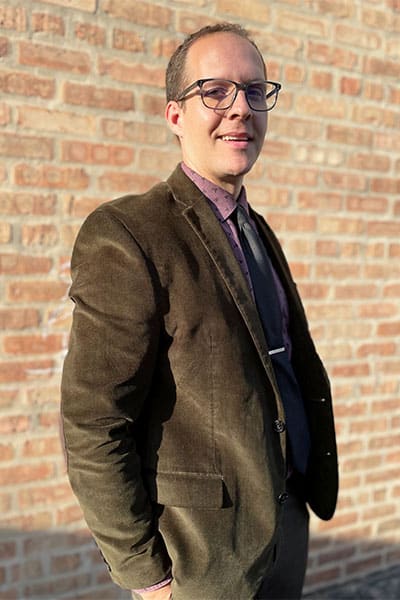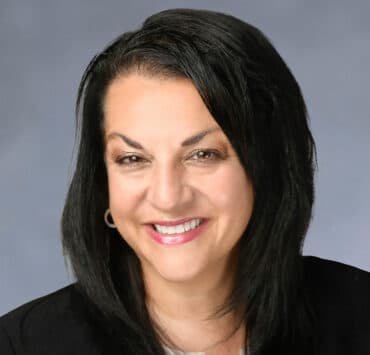Jared Swiecicki (swi-sick-ee) once visited dozens of hospitals in forty-four states in a single year. He wasn’t an administrator, a sales rep, or a physician. In fact, Swiecicki was just twenty years old. He had taken a year off from studying public relations at Central Michigan University to intern as an actor and performer with a nonprofit that did therapeutic entertainment for patients in the Veterans Health Administration system.
Swiecicki performed in 320 shows that year and interacting with military veterans receiving care in VA medical facilities sparked in him a new passion. When Swiecicki’s internship ended, he returned to college determined to shift away from public relations to pursue a career in healthcare.

Swiecicki made the change after noticing how he could make an impact. “I saw exceptional facilities, and I saw facilities that were lagging behind. As I developed relationships with patients, I knew there must be something I could do to help them,” he explains. Swiecicki also thought of his own grandfather, a military veteran who struggled to receive quality care at the end of his life.
That patient-centered focus and desire to make an impact led Swiecicki to earn a master’s degree in healthcare administration from Ohio University and has stayed with him throughout a career that has been defined by leveraging diverse backgrounds, collaborating on high-performing teams, and taking calculated risks to make an organizational difference.
He spent a decade building relationships and navigating fast-paced organizations like the American Hospital Association, University Healthsystem Consortium (now Vizient), and Northwestern Memorial Healthcare. Along the way, Swiecicki developed revenue cycle expertise and moved into accounting roles where he developed and implemented workflows, tools, and strategies to help facilitate positive change within healthcare organizations.
In 2017, Swiecicki joined his current organization, University of Chicago Medicine, where as director of accounts receivable, he manages a forty-member team that processes cash and credit payments while handling insurance claims, follow-ups, denials, and disputes. For Swiecicki, the job is a fulfilling one because he sees a direct connection between his work in revenue cycle and the medical center’s position in the market.
“Whenever my teams make strong agreements with a payer, capture revenues, or make a process more efficient, we’re bringing in resources that that allow departments to offer the highest level of patient care, expand to new locations, and continue to push the boundaries of medical services and technology,” he explains.
That reality motivates Swiecicki to push for fresh ideas, something he says he learned from Brad Cox during his time at Northwestern, where he was given the freedom to “fail well” in the pursuit of innovation. That freedom and sentiment continues at UChicago Medicine as Swiecicki works alongside Mamoon Nawabi, the physician group executive director and countless other leaders across the organization.
“Improv, performance, and leadership are all about listening and responding, and those who want to succeed in revenue cycle need to bring innovation and creativity to the table.”
Some of Swiecicki’s risks have yielded big results for UChicago Medicine. Upon his arrival, he worked with his managers, Meaghan Kleinfeldt and Maryann Greene, to add notes, activities, and new data fields to the organization’s internal Epic billing system. At first, some users were hesitant to click through and enter more information, but when they got more complete patient data back to work with, they became enthusiastic adopters. Those employees understood they were armed with better data they could then use to drive conversations with payers.
“Jared’s strong collaboration with Availity and his ability to actively engage team members has yielded great results for his organization,” contends Swiecicki’s partners on the account management team at Availity. “He continues to drive down denials with his proactive, data driven approach to revenue cycle management.”
Buoyed by the early success, Swiecicki is looking for other ways to leverage automation and other tech tools. The first step is meeting with employees to uncover pain points. Swiecicki watched in horror as a business analyst showed him just how manual her reconciliation process was. He asked IT to find a way to automate the painstaking and repetitive task, and Director Drake Shrode built an Excel macro that saves hundreds of hours of work each month. That business analyst, Jessica Adamski, went on to use her saved time to find improvements of her own and is now the manager of cash and credits.
As a leader, Swiecicki does all he can to help employees continue their education and advance to the next steps in their careers. During his career, he’s seen one team member become a director, four become managers, and several others take on leadership or supervisor roles. Those are the moments Swiecicki points to as some of his proudest accomplishments.
Although Swiecicki took a nonlinear and nontraditional path to his role and industry, he is thriving in revenue cycle at UChicago Medicine. He hopes others will join him. “There are people in our department who come from healthcare backgrounds, people from other industries, and people who lack formal training,” he says. “I want everyone to know that they can follow any path to revenue cycle and add value by using their diverse knowledge and skill sets to help us find new solutions to old problems.”
Now that Swiecicki is firmly entrenched in healthcare and parenting two young children with his partner Katy, he doesn’t have much time to pursue acting or his other hobbies. However, he still relies heavily on the skills he gained performing for veterans and at Chicago’s Improv Olympics in his professional life.
“Improv, performance, and leadership are all about listening and responding, and those who want to succeed in revenue cycle need to bring innovation and creativity to the table,” he says. Theater, improv, and other nontraditional backgrounds can help anyone in healthcare observe, listen, and contribute to the organization’s important mission. And for Swiecicki, that creativity has allowed him to not only fail well but succeed better.

